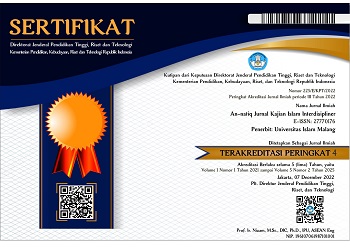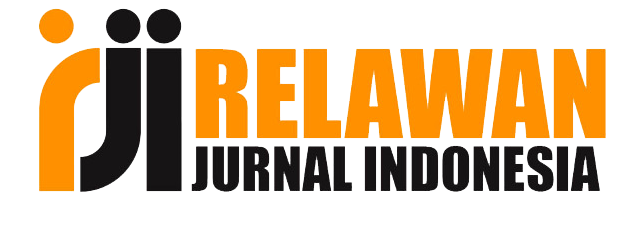REVITALISASI MAKNA HIJRAH DALAM AL-QUR’AN DAN RELEVANSINYA PADA MODERASI ISLAM
DOI:
https://doi.org/10.33474/an-natiq.v2i1.13952Keywords:
Hijrah, Revitalization, Moderation of IslamAbstract
The phenomenon of hijrah in today's modern society has a significant impact on changes in social attitudes. The change was based on the pros and cons in the meaning of the concept of Hijrah, the attitude of accusing each other and not respecting each other's views which led to social conflict so that it led to the loss of a sense of concern and a sense of togetherness between communities and religious communities. Revitalizing the concept is a reconstructive effort to create religious moderation, especially among Muslims themselves. Islamic moderation is an attempt to accept differences from each other's views, so as not to cause social problems. This article seeks to explain the important things that need to be done by everyone who conducts an assessment of the basic concepts that have implications for parallel and harmonious relations in society, especially on the issue of hijrah. People who emigrate should be an example for every spiritual and social action, not creating a problem of inequality and leading to estrangement in relations between fellow religious people. Hijrah taught by the Prophet, is the movement and change in the attitudes, habits and goals of a person's life which leads to a peaceful life that reflects the Islamic religion which is Rahmatallil 'aalamiin.
References
Abidin, Z. (2013). Islam Inklusif: Telaah Atas Doktrin dan Sejarah. Humaniora, 4(2), 1273.
al-Qurtubi, A. ’Abdullah. (1384). Al-Jami’ li Ahkam al-Qur’an. Dar-al-kutub al-Islamiyyah.
Al-Asqalani al-Syafi’i, A. bin A. bin H. A. A.-F. (1379). Fathul Bari; Syarah Shahih Al-Bukhari (Vol. 1–Juz 6). Dar al-Ma’arifah.
Aswadi, A. (2014). Refomulasi Epistemologi Hijrah dalam Dakwah. ISLAMICA: Jurnal Studi Keislaman, 5(2), 339. https://doi.org/10.15642/islamica.2011.5.2.339-353
Dawing, D. (2018). MENGUSUNG MODERASI ISLAM DI TENGAH MASYARAKAT MULTIKULTURAL. Rausyan Fikr: Jurnal Studi Ilmu Ushuluddin dan Filsafat, 13(2), 225–255.
Fauzi, A. (2018). Moderasi Islam, untuk Peradaban dan Kemanusiaan. JURNAL ISLAM NUSANTARA, 2(2), 232. https://doi.org/10.33852/jurnalin.v2i2.101
Glasse, C. (2002). Ensiklopedi Islam. Raja Grafindo Persada.
Ibn Zakariya., A. H. A. I. A.-F. (1974). Mu’jam Maqayis al-Lughah, di Tahqiq oleh Abd al-Salam Muhammad Harun. Dar al-Fikr.
Jalaluddin al-Suyuthi, J. al-Mahalli. (t.th). Tafsir Al-Qur’an al-Adzim: Vol. Juz 1. Nurul Huda.
Mubakkirah, F. (2018). Moderasi Islam: Dari Konsep Menuju Identitas. Bilancia: Jurnal Studi Ilmu Syariah dan Hukum, 12(2), 241–261.
Prasanti, D., & Indriani, S. S. (2019). Konstruksi Makna Hijrah Bagi Anggota Komunitas Let’s Hijrah dalam Media Sosial Line. Al-Izzah: Jurnal Hasil-Hasil Penelitian, 14(1), 106.
Shihab, M. Q. (2002). Tafsir al-Misbah: Vol. Vol. V. Lentera Hati.
Shihab, Q. (1997). Tafsir Al-Qur’an al-Karim, Tafsir Atas Surat-surat Pendek Berdasarkan Urutan Turunnya Wahyu: Vol. Cet. II. Mizan.
Siradj, S. A. (2013). Tasawuf Sebagai Basis Tasamuf: Dari Social Capital menuju Masyarakat Moderat. 13(1), 20.
Syarif, & Zuhri, S. (2019). Memahami Hijrah Dalam Realitas al-Qur’an dan Hadis Nabi Muhammad. Jurnal Living Hadis, 4(2), 277.
Yusuf, M. F. (2019). Dakwah Simbolik Hijrah dan Moderasi Agama di Media Online. 4, 17.


























